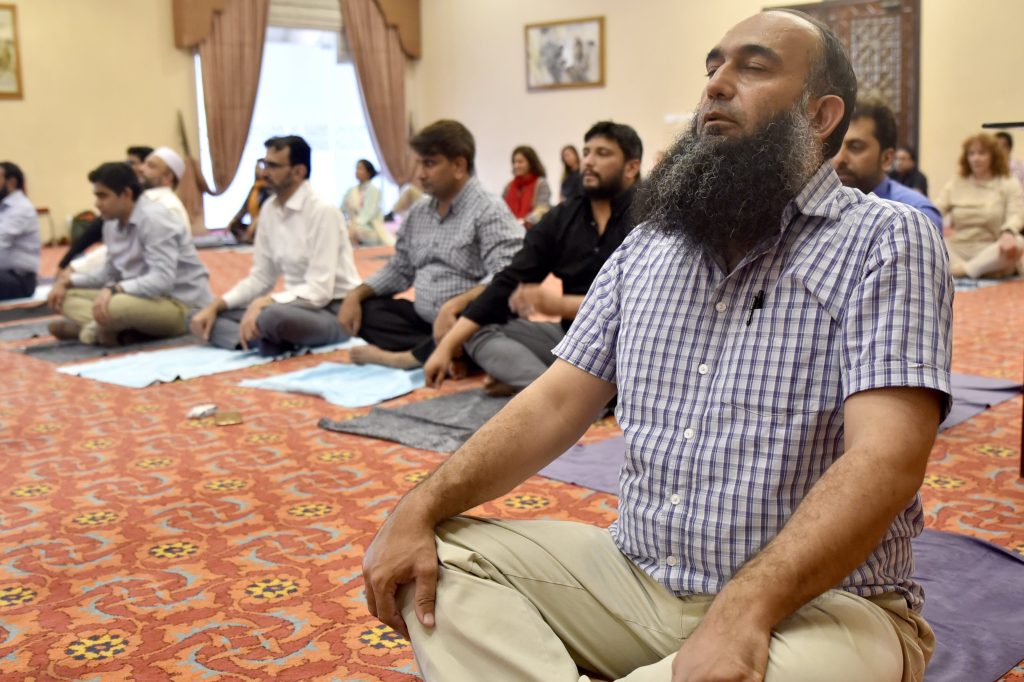When conflict erupts or a hurricane makes landfall, United Nations workers mobilize to help people in need. When poverty, climate change, or both devastate communities, UN workers move into action to help rebuild. These workers are on the front lines of global challenges, helping families in their time of need, and it can be stressful. Yet there is not a lot of attention given to the pressures facing humanitarian and development workers.
Support people need support, too.
That is why the United Nations Foundation has joined forces with lululemon to launch “Peace on Purpose,” a program that equips UN workers with tools to care for themselves, so they can effectively care for the world. We explain it here:
Stressful environments and mental health
Working on grave problems in stressful environments can impact a person’s mental health and well-being. According to a 2015 UN staff survey, “Approximately half of all United Nations staff members reported experiencing symptoms consistent with a mental health condition.” News stories have chronicled the mental health risks facing aid workers exposed to stress and trauma.
This can have a ripple effect. When workers are burned out and suffering, it is harder to be effective at their jobs. The World Health Organization notes that depression and anxiety worldwide cost the global economy $1 trillion per year in lost productivity.
Addressing mental health in the workplace is the right thing to do and the smart thing to do in order to improve health, productivity, and organizational effectiveness.
UN support for its people
To better support the needs of the UN workforce, the Secretary-General António Guterres launched a UN system-wide strategy on mental health and well-being in 2018. This strategy adds to the efforts of many UN agencies to care for their teams. Specifically, the strategy aims to:
- Create a workplace that enhances mental and physical health and well-being;
- Develop, deliver, and evaluate high-quality psychosocial services everywhere that UN staff work;
- Welcome and support staff who live with mental health challenges; and
- Ensure sustainable funding for mental health and wellbeing services.
As the Secretary-General said, “Promoting the mental health and well-being of the workforce of the United Nations is a fundamental aspect of management’s duty of care to staff. It is also crucial for carrying out our work for the world’s people.”
Peace on Purpose
To support and complement the UN’s efforts on mental health and well-being, the UN Foundation and lululemon teamed up to launch “Peace on Purpose” – a training program that provides UN workers with mindfulness and self-care tools for their physical and mental health.
Over the past three years, the program has been in a development and pilot phase. To start, we worked with an expert to develop the curriculum, which teaches tools – such as mindful breaths, emotion regulation, and yoga – that can easily be implemented to meet the varying needs of UN staff in the diverse environments in which they operate.
Then, we worked with UN agencies to build out Peace on Purpose trainings and workshops for more than 650 staff in U.S. headquarters and seven additional countries – Jordan, Lebanon, Pakistan, South Sudan, Turkey, Turkmenistan, and Zimbabwe.
Research that followed select trainings found that over half of the participants experienced a more than 40% improvement in overall well-being.
“After a hectic day and a lot of work stress, we need some time to relax and exercise,” a UN worker in South Sudan said of the program. She continued: “From the training, we have learned a lot of tools to help us to improve in our performance.”
Now, we are looking to grow the program over the next three years thanks to a $1 million commitment from lululemon. With lululemon’s continued partnership, Peace on Purpose will aim to train 3,000 more UN development and humanitarian workers in-person over the next three years, build a hub of digital resources, and develop condensed trainings and curriculum translations to reach an additional 30,000 UN staff.
Our theory of change is simple: By focusing on aid workers on the front lines of global challenges like humanitarian emergencies, we can strengthen their work in service of vulnerable communities. Both the UN Foundation and lululemon believe that in order to build a better world, we need to support the people on the front lines of change.
When the world is going through the worst, UN workers have to give their best – and we’re determined to help them.

